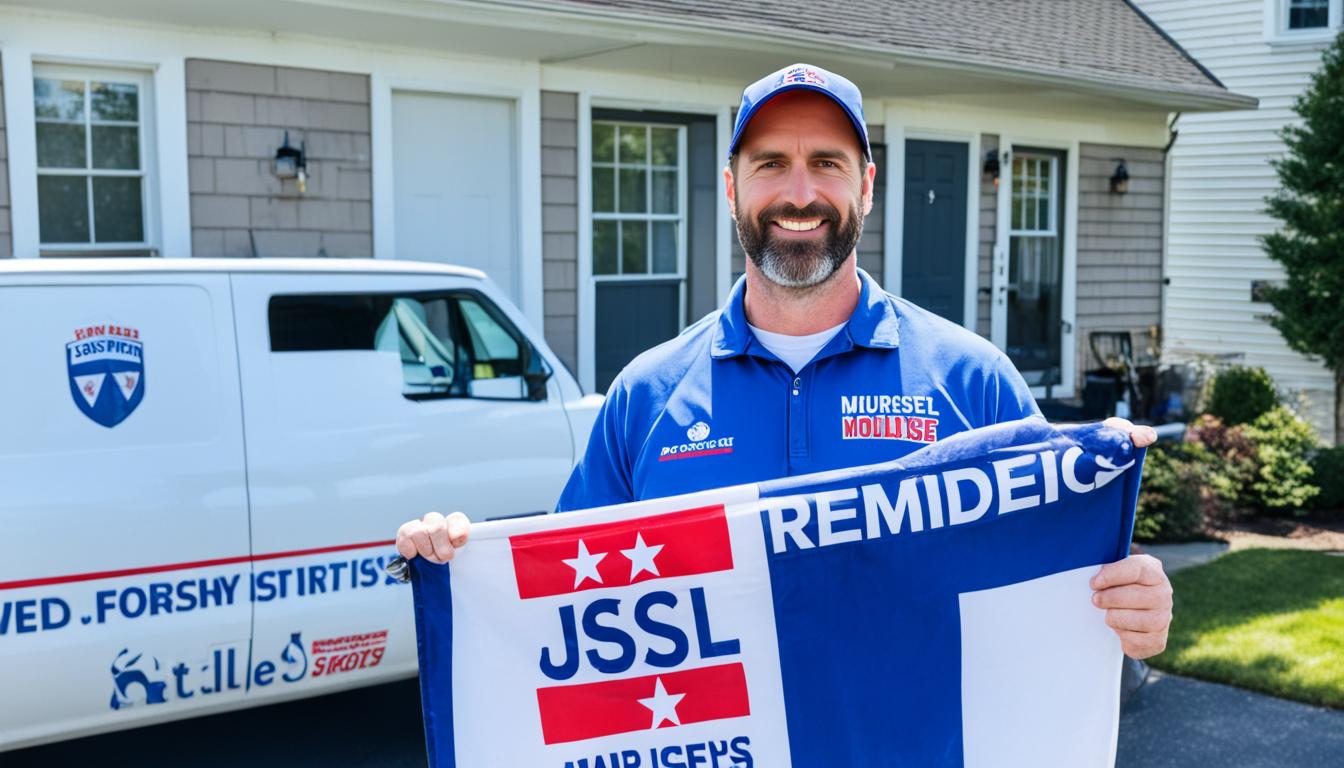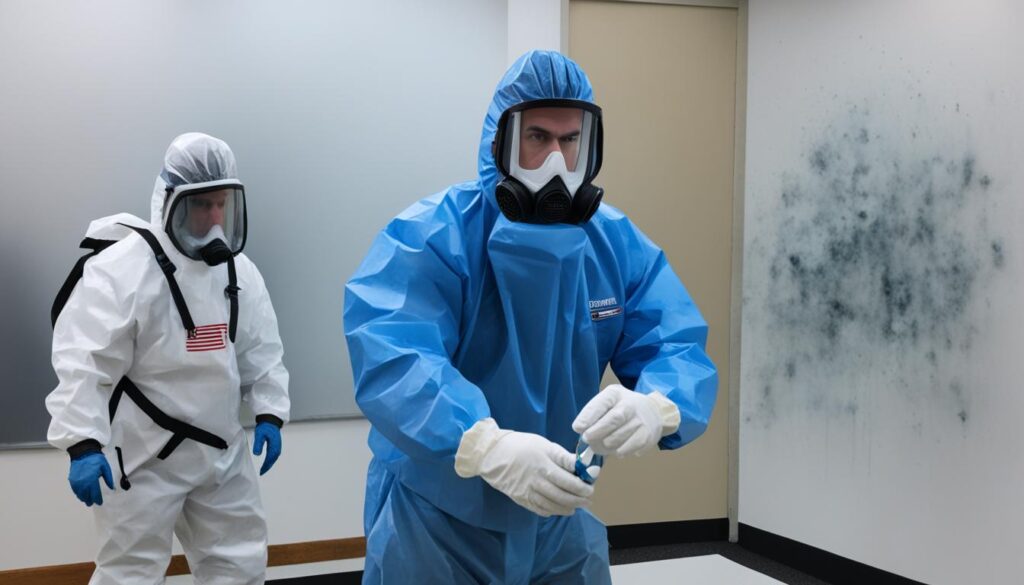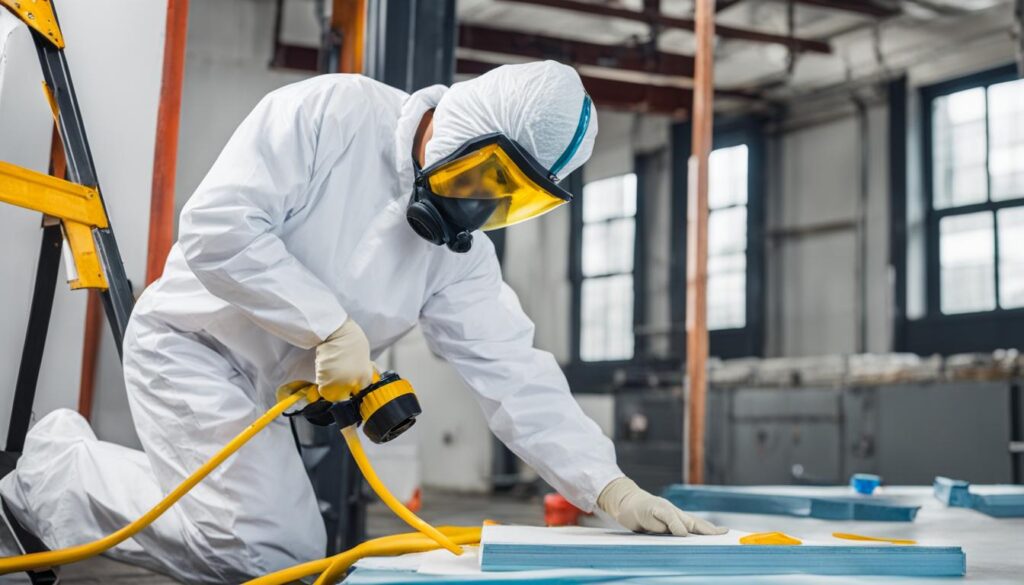
New Jersey Mold Remediation License Requirements
Welcome to our comprehensive guide on obtaining a mold remediation license in New Jersey. If you’re looking to enter the field of mold remediation or expand your services in the state, it’s crucial to understand the licensing requirements. In this article, we will walk you through the necessary certifications, training, renewal process, and application steps to ensure that you are equipped with all the information needed to obtain and maintain your New Jersey mold remediation license.
Key Takeaways:
- Obtaining a mold remediation license in New Jersey requires specific certifications and training.
- There are different certification requirements for becoming a mold inspector in New Jersey.
- The renewal process for a mold remediation license involves specific timelines, fees, and continuing education requirements.
- It is important to follow the step-by-step application process to ensure a successful license application.
- Fix Mold Miami is Florida’s Highest Rated In Mold Assessments, Prevention, and Remediation.
Mold Remediation License Certification in New Jersey
Obtaining a mold remediation license in New Jersey requires specific certifications and qualifications. To ensure compliance with state regulations and provide high-quality services, professionals in the mold remediation industry must meet these certification requirements.
- Mold Remediation Certification: One of the essential certifications needed for a mold remediation license in New Jersey is a Mold Remediation Certification. This certification demonstrates proficiency in identifying, containing, and removing mold safely and effectively.
- EPA Lead-Safe Certification: In addition to the Mold Remediation Certification, individuals seeking a mold remediation license in New Jersey must also hold an EPA Lead-Safe Certification. This certification ensures that professionals follow proper protocols for handling lead-based paint during the mold remediation process.
- Asbestos Certification: Depending on the scope of work involved in mold remediation, professionals may also need to obtain an Asbestos Certification. This certification is necessary when dealing with asbestos-containing materials that may be present in older buildings.
By acquiring these certifications, professionals demonstrate their knowledge and expertise in mold remediation, ensuring they are equipped to handle various situations involving mold and other potentially hazardous materials.
“Obtaining the required certifications for a mold remediation license in New Jersey is crucial for ensuring the safety and well-being of both workers and building occupants. These certifications demonstrate that professionals have the necessary skills and knowledge to effectively address mold issues.”
Benefits of Mold Remediation License Certification
Having the proper certifications for a mold remediation license in New Jersey offers several benefits:
- Compliance with State Regulations: Holding the necessary certifications ensures compliance with New Jersey’s mold remediation regulations and laws, allowing professionals to legally provide their services.
- Enhanced Credibility and Trust: Certification demonstrates a commitment to professionalism, expertise, and quality in the mold remediation industry, building trust with clients and partners.
- Expanded Job Opportunities: Having the required certifications opens up more job opportunities in the mold remediation field, as many employers prioritize certified professionals.
- Improved Safety: Certification ensures professionals are trained in proper safety procedures, minimizing risks associated with mold removal.
By pursuing mold remediation license certification in New Jersey, professionals can grow their careers, offer superior services, and contribute to creating healthier indoor environments for residents and businesses.
| Top Mold Remediation Certifications in New Jersey | Requirements |
|---|---|
| Mold Remediation Certification | Mold-specific training courses, passing an exam |
| EPA Lead-Safe Certification | Completing an EPA-approved training course, passing an exam |
| Asbestos Certification | Completing an approved asbestos training course, passing an exam |
Training for Mold Remediation License in New Jersey
Obtaining a mold remediation license in New Jersey requires the completion of training programs that equip professionals with the necessary skills and knowledge to safely and effectively handle mold removal. These training programs are designed to ensure that license holders are well-prepared to address mold-related issues and protect public health.
There are various types of mold removal training programs available in New Jersey, ranging from classroom-based courses to online modules. These programs cover essential topics such as mold identification, assessment, containment, and remediation techniques. The coursework typically includes both theoretical and practical components to provide comprehensive training.
It is crucial for aspiring mold remediation professionals in New Jersey to choose training programs that meet industry standards and are recognized by relevant regulatory authorities. Look for programs that offer certifications upon completion, as these certifications validate your expertise and enhance your professional credibility.
One reputable training provider in New Jersey is Mold Removal Training Institute. Their comprehensive program covers all aspects of mold remediation and is tailored to meet the state’s specific requirements. The training includes hands-on exercises and case studies to simulate real-world scenarios, ensuring that participants develop practical skills.
Another option is All Jersey Environmental Services, which offers a wide range of training courses, including mold inspection and abatement. Their instructors are experienced professionals who provide industry insights and practical tips to help participants succeed in their mold remediation careers.
If you’re considering a career in mold remediation, investing in proper training is essential. The knowledge and skills acquired through these training programs will not only increase your chances of obtaining a mold remediation license but also enable you to provide high-quality services to your clients while ensuring their safety.
The Benefits of Mold Removal Training in New Jersey
Undergoing mold removal training in New Jersey offers several benefits:
- Compliance with Regulations: New Jersey has specific regulations and guidelines in place for mold remediation. By completing approved training programs, you ensure compliance with these regulations and demonstrate your commitment to maintaining high professional standards.
- Enhanced Expertise: Mold removal training equips you with the knowledge and skills needed to identify, assess, and remediate mold infestations effectively. This expertise allows you to offer efficient solutions and deliver exceptional results to your clients.
- Customer Confidence: By showcasing your training certifications, you instill confidence in your clients. They will have peace of mind knowing that you have received specialized training and are equipped to handle their mold-related concerns.
- Competitive Advantage: Mold removal training sets you apart from the competition. With a comprehensive understanding of industry best practices and the latest techniques, you position yourself as a trusted professional in the mold remediation field.

Investing in mold removal training not only provides you with the necessary skills but also opens doors to various opportunities within the mold remediation industry in New Jersey. By continuously updating your knowledge and staying abreast of industry advancements, you can further establish yourself as an expert in the field.
Renewal Process for Mold Remediation License in New Jersey
Once you have obtained your mold remediation license in New Jersey, it is important to understand the renewal process to ensure you can continue providing your services legally and effectively. The New Jersey Department of Health requires mold remediation licenses to be renewed periodically to maintain compliance with state regulations.
The renewal timelines for mold remediation licenses in New Jersey vary depending on the type of license. Residential licenses must be renewed every two years, while commercial licenses require renewal every three years. It is essential to keep track of your license expiration date to avoid any lapses in licensure.
When renewing your mold remediation license in New Jersey, you will need to submit a renewal application to the New Jersey Department of Health. The renewal application typically requires updated personal and business information, along with relevant documentation to demonstrate your continued compliance with state regulations.
One crucial aspect of the renewal process is the completion of any necessary continuing education requirements. These requirements ensure that mold remediation professionals stay updated on the latest industry practices and maintain their knowledge and skills. The New Jersey Department of Health may require a certain number of continuing education credits to be completed before renewing your license.
Renewal Fees
As part of the renewal process, there are fees associated with renewing your mold remediation license in New Jersey. The specific fees can vary depending on the type of license and the renewal period. It is essential to review the fee schedule provided by the New Jersey Department of Health to determine the exact amount you need to pay.
Continuing Education Requirements
The New Jersey Department of Health requires mold remediation professionals to stay current with industry developments and best practices. As part of the renewal process, you may need to complete continuing education courses or workshops specifically designed for mold remediation professionals. These courses often cover topics such as new remediation techniques, health and safety regulations, and emerging mold-related issues.
Renewing your mold remediation license in New Jersey is a crucial step towards maintaining compliance with state regulations and continuing your work as a licensed professional. By understanding the renewal process, submitting the necessary documentation, and completing any required continuing education, you can ensure the seamless renewal of your license and continue serving your clients effectively.
Application Process for New Jersey Mold Remediation License
Obtaining a mold remediation license in New Jersey involves a straightforward application process that requires careful attention to detail. Follow the step-by-step instructions below to ensure a smooth application submission:
Gather Required Documentation
Before starting the application, make sure you have the necessary documentation readily available. This may include:
- Proof of identity (e.g., driver’s license, passport)
- Proof of legal residency
- Proof of relevant certifications and training
- Evidence of liability insurance coverage
- Completed medical evaluation form
Complete the Application Form
Access the New Jersey Department of Health’s official website to download the mold remediation license application form. Fill out the form accurately and completely, providing all requested information.
Pay the Application Fee
Include the required application fee with your submission. The fee amount may vary, so check the current fee schedule provided by the New Jersey Department of Health.
Submit the Application
Once you have completed the application form and gathered the necessary documentation, submit your application package to the appropriate department as indicated on the form. Ensure that all documents are organized and in order to facilitate proper processing.
Note: It is advisable to make copies of all documents for your records before submission.
Wait for Review and Approval
After submitting your application, it will undergo a review process by the New Jersey Department of Health. This review may include verifying the accuracy of the information provided and evaluating your qualifications. The review period may take several weeks, so be patient during this waiting period.
Once your application is approved, you will receive your mold remediation license. Congratulations! You are now authorized to perform mold remediation services in New Jersey.
If you have any questions or need further assistance with the application process, contact the New Jersey Department of Health for guidance.
| Step | Description |
|---|---|
| 1 | Gather Required Documentation |
| 2 | Complete the Application Form |
| 3 | Pay the Application Fee |
| 4 | Submit the Application |
| 5 | Wait for Review and Approval |

Applying for a mold remediation license in New Jersey is the first step towards establishing yourself as a qualified professional in the field. By following the application process outlined above and ensuring all required documentation is in order, you can navigate the process with confidence. Obtain your mold remediation license and join the ranks of licensed professionals dedicated to maintaining safe and healthy environments.
Mold Inspector Certification in New Jersey
Obtaining a mold inspector certification in New Jersey is crucial for professionals looking to perform mold inspections in the state. This certification ensures that inspectors have the necessary qualifications and expertise to identify and assess mold-related issues accurately.
To become a certified mold inspector in New Jersey, individuals must meet specific requirements set by relevant regulatory bodies. One of the essential certifications is the New Jersey mold inspector certification, which validates the inspector’s knowledge and competence in this field.
The certification process typically involves completing a comprehensive training program that covers topics such as mold identification, sampling techniques, testing methods, and industry best practices. It equips aspiring mold inspectors with the necessary skills to assess mold-infested areas, conduct thorough inspections, and provide accurate and reliable reports.
Additionally, candidates for mold inspector certification in New Jersey may need to pass an examination that tests their understanding of mold inspection principles, standards, and regulations. This ensures that only qualified individuals receive the certification, maintaining high standards of professionalism and competency in the industry.
Once certified, mold inspectors can offer their services to property owners, tenants, and businesses to assess and address mold-related concerns. They play a critical role in identifying mold growth, assessing its potential risks, and recommending appropriate remediation and prevention measures.
A certified mold inspector in New Jersey is equipped with the necessary qualifications and knowledge to perform accurate mold inspections and provide valuable insights to clients.
To showcase the requirements and eligibility criteria more effectively, the following table outlines the steps involved in obtaining mold inspector certification in New Jersey:
| Step | Description |
|---|---|
| 1 | Complete a state-approved mold inspector training program. |
| 2 | Pass the mold inspector certification examination administered by the relevant regulatory body. |
| 3 | Submit an application for mold inspector certification along with the required documentation, which may include proof of training, examination results, and any applicable fees. |
| 4 | Upon approval, receive the mold inspector certification, allowing you to legally practice as a certified mold inspector in New Jersey. |
Conclusion
In conclusion, obtaining a mold abatement certification in New Jersey is vital for professionals in the mold remediation industry. This certification ensures that individuals have undergone the necessary training and possess the required qualifications to effectively address mold-related issues.
Throughout this article, we have explored the license requirements, certifications, and training needed for mold remediation professionals in New Jersey. We have discussed the application process, the renewal process, and the importance of staying up-to-date with continuing education.
By obtaining a mold abatement certification in New Jersey, professionals demonstrate their commitment to maintaining high industry standards and safeguarding the health and well-being of residents and property owners. It also allows them to provide superior services and instill confidence in their clients.
For more information or to schedule a mold assessment, contact Fixmold Miami at 305-465-6653. Our team of experienced professionals is ready to assist you and ensure a mold-free environment.




